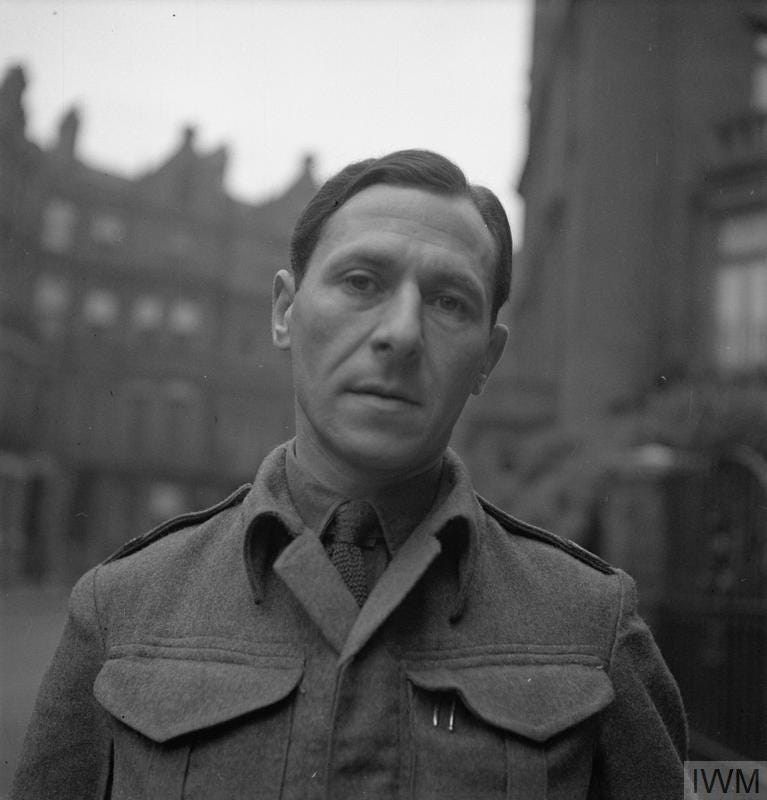War and wine with Cyril Ray
Cyril Ray’s wartime dispatches for The Guardian aren’t particularly compelling from a distance of 75 years.
Known primarily for his coverage of the British Eighth Army’s campaign in Italy late in 1943, Ray stuck mostly to big-picture situational reports, providing little insight into what life was like for the soldiers on the ground.
This is one his livelier reports, filed Dec. 26 of that year and printed three days later:
After seven days and six nights of fighting in the streets and houses, about two-thirds of Ortona is now ours. Although our eventual mastery of the town has never been in doubt, German parachute troops have shown such courage and cunning in its defence that it would be rash even now to suggest that the Canadians will clear it without some further delay and further cost.
I have been into the town twice and hope never to see again such ruin and such slaughter. I cannot hope to see greater courage than is being shown by both attackers and defenders.
His empathy for both Allied troops and the enemy stands out as unique, and was reflected in his brief description of his most celebrated moment in Italy. At one point as he accompanied Canadian troops in Ortona, he picked up a gun and led to safety a contingent of men who had lost all of their officers and NCOs.
“I like to think that I managed it without killing any Germans,” he later told the author Phillip Knightley.
Like that quote, Ray’s overall body of work from Italy was, well, rather dry. But that particular word would come in handy when Ray finally settled into his niche 15 years later.

Born March 16, 1908 in Lancashire, Ray began working for The Guardian in 1936 and remained with the newspaper until jumping to the BBC early in 1944. He covered Operation Market Garden and the Battle of the Bulge for the broadcaster before spending the balance of the European campaign with Patton’s Third Army as it rolled into Germany.
After the war, Ray returned to writing, working as a foreign correspondent, columnist and critic for various outlets. He also became an author in 1948 when the first of the more than two dozen books he would write or edit over the next 35 years was published. While a few of those were military titles, most were about wine.
Ray began writing about the topic on a regular basis in the spring of 1959 with a Sunday column in The Observer — initially titled “Wine Wisdom” and later “Wine List” — that continued through his retirement in December 1973.
He also wrote features, including a memorable 1961 piece in which he wined-and-dined around London and beyond with an anonymous Michelin guide inspector (given the pseudonym Pierre). The alleged premise was in the article’s introduction — “Just how bad are English restaurants?” — but it turned out to be an examination of his companion’s meticulous methods.
A native of Burgundy, “Pierre” upon selection for his coveted role “was taught to remember tastes as others remember sights and sounds,” Ray wrote.
What I remembered was that every time a waiter passed behind my chair he jogged the back and his sleeve brushed against my hair; and that a squeeze of lemon from the next table splashed me and my next-door neighbour.
The difference between the gastronomic chronicler and the Michelin man was that Pierre, while he didn’t let this go unnoticed, was still sufficiently unruffled to distinguish between the sweetbreads and the sauce. The Observer man was a little bloody-minded all evening.
Five years later, Ray published The Wines of Italy, and after retirement from the newspaper business he would complete companion titles on France and Germany. By that point he was sufficiently established as an authority on the topic that a 1978 release bore the title Cyril Ray’s Book of Wine.
Ray died in 1991 at age 83, but perhaps his finest epitaph came from his own typewriter in his farewell Observer column nearly 20 years earlier. As he said goodbye to his readers, Ray had a suggestion “should any kind reader wish to raise a glass, with a nod in my direction, after I have drawn my last salary cheque but not, as yet, my last breath” — a cocktail of Pimm’s and sparkling wine with minimal garnish.
I am a simple chap and would wish to have my health drunk in concoctions not too elaborate.
And now I must fizz off …



